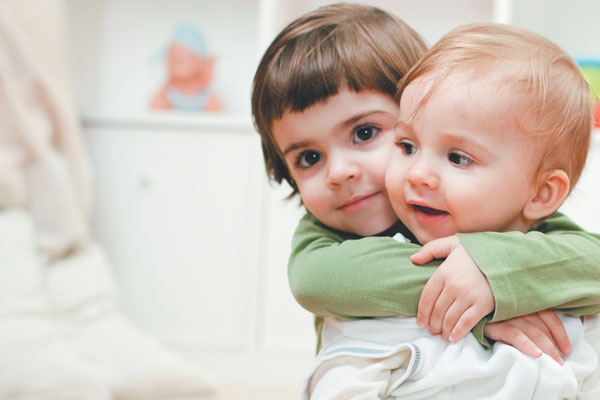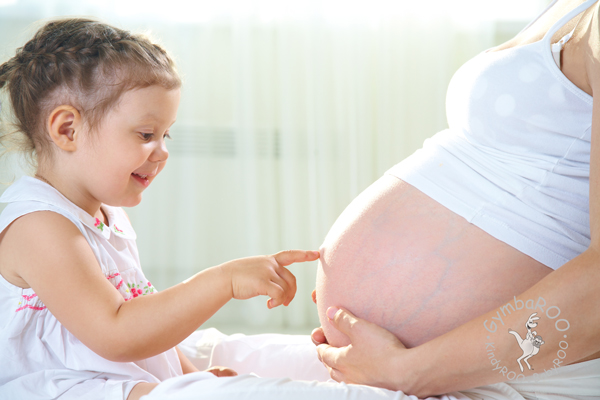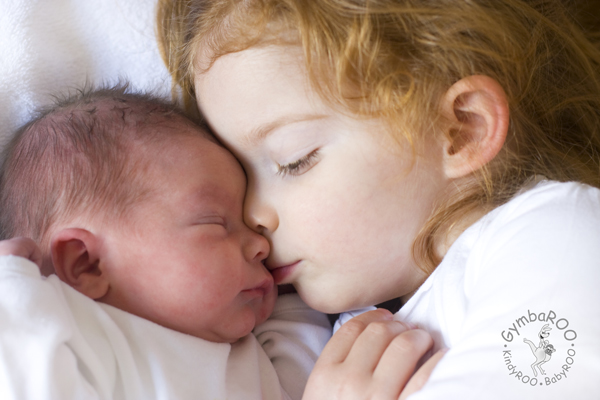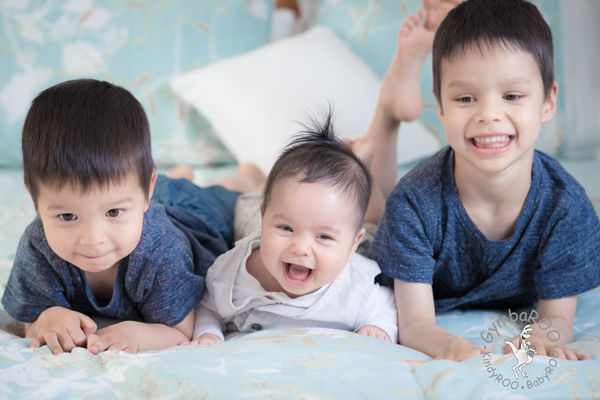Join the thousands of parents already raising smarter, happier babies with our online baby classes: The Active Babies Smart Kids series. Click here.
GymbaROO-KindyROO kids are excelling academically, emotionally, in leadership roles and on the sporting field. Find us at: GymbaROO-KindyROO
During the first two years, your child has been the centre of his family and, in his growing mind, the centre of the universe. He has gone through the attachment phase of his life. The child has learnt that the world is a warm and secure place and that if he communicates his needs, his parents will take care of him. However, there comes a time in early toddlerhood when a child needs to learn what it means to ‘wait’. Waiting involves delaying gratification and realising that there are other people that are just as important as he is.
Few experiences initiate this rite of passage in the same way as the birth of a sibling. The arrival of a baby brother or sister can help your child to understand what it means to wait and share and to give him a sense of becoming independent. It will also help reinforce that no matter what happens, a parent is still there to nurture, support and love him.
It is important to prepare your child and help him to understand his place in the family. At some point during the pregnancy, the child realises that something is different. For a child under 2 1/2, it is best to wait to break the news of a sibling, until the last trimester. Telling him earlier will be confusing, as he has no sense of time passing.
Remember that children under the age of three are normally egocentric. It is best to walk him through his own infancy by looking through his baby album. During this time you can engage the toddler in a preparatory conversation that plants the seed to help him gain a sense of what to expect. Talk about how a tiny baby needs to be fed a lot, how a baby needs to be carried about, how he cried because he could not talk and mummy and daddy had to pay a lot of attention to him. Emphasise though that eventually the baby will be a big kid, just like his brother. Get the child involved by encouraging him to pat your pregnant tummy and talk to his new brother or sister.
Take the child along to prenatal checkups so he can hear the baby’s heart beat and watch the ultrasound pictures. When the baby kicks, have him touch your tummy and introduce himself to the baby. While in hospital, the toddler is probably more interested in what’s going to happen to him than what’s happening to mummy. Try and have hands free when the toddler arrives, so he can be greeted before being introduced to the baby. Invite the toddler to feel the baby’s hands and feet, even if she is being fed. Encourage as much contact with the baby as possible. Tell him, “Your feet used to be as small as that.” Let the toddler hold the baby after being shown how to do it.
While it’s normal for a toddler to feel uneasy about the new baby, don’t assume that the firstborn will feel displaced. Often children are delighted and interested in the new baby but are more confused about how mummy has changed.
Tell the toddler that something special will happen when mummy is in hospital. “Grandma is coming to our house. You can make some play-dough with her and she will read your favourite story.” While mummy is in hospital encourage several visits, so he gets to know the baby and not feel as if a stranger is brought home.
Siblings early days together are the building block for a long-term bonding process. Every child will react differently, but there are a few helpful things to do. Take advantage of the toddler’s natural fascination with babies by explaining to him what a baby is thinking, such as: “When your baby sister grabs you and holds on tight, she is telling you how much she loves you.” These explanations will make a toddler laugh and help him see his sibling is a real person.
Before birth, wrap a few small gifts and reserve them for your toddler when visitors lavish gifts on the new baby. Let the toddler be the one to unwrap the gift before he gives it to his sister. It will help change his mind set to becoming a giver, a valuable lesson that even a two year old can begin to learn.
When people heap attention on the baby, the toddler may feel neglected. So include him in the compliments. When the admirer says “What a beautiful baby”, you can add “Now we have two beautiful children, a baby and her beautiful brother.”
It’s unrealistic to think that a mother will give equal time to the baby and the toddler, but time caring for the baby can be shared. When feeding the baby, read a book or listen to music together. Encourage the toddler to entertain her by making funny faces or noises. Both will love these moments. When the baby smiles back, it can be an incredible boost to the toddler, as he thinks, “She likes me,” or “Aren’t I clever to make her smile!”
Encourage dad to take a bigger role as the toddler has lost some of mum’s time. Reserve one-on-one outings with dad, just for the toddler. Remember that in a child’s perception of love, actions often speak louder than words.
Even when doing the very best, parents will find that the child will appear confused and at times act out. It is a normal part of becoming an older sibling, but there are ways to tackle problems.
Take time to simply listen and support whatever feelings the child has, whether it be confusion, fear, excitement, interest, happiness, anger, empathy, sadness and realize that with time relationships will settle in.
If your toddler is not toilet trained or sleeping in a big bed, do not rush the milestones because of the new baby. It’s a good idea to hold off on introducing any new aspects to your toddler’s life. Feed his ego by talking about what a great big sibling he is and how many things he can do on his own.
Most children will show some regression of “I want to be a baby too!” This is a normal reaction to the mum holding and cuddling the newborn. Allow him to regress a little while at the same time focusing on the benefits of being an older child in the family. Talk about all the fun things toddlers can do while babies can’t. Big boys can kick a ball, but babies can’t. Big boys can turn the pages of a book and build with blocks, but babies can’t. The toddler will gradually realize that he doesn’t want to be a baby again.
Allow for some frustrations and help him learn to manage them. “You’ll have to wait until I finish feeding your sister. Then we will go to the swings.” Ensure that he has some special time with you on your lap, cuddling, talking, playing while the new baby sleeps. Even 15 minutes of holding a day can make a huge difference. Let your child feel that he is your first child and no one will ever take that place. If possible let a relative take care of the baby at times, so you can spend some special time with your firstborn.
Assign some tasks to help the toddler feel included. “Let’s bath and dress the baby together. Can you pick an outfit for her? Can you give her a gentle pat on the back or sing a song to her?” Make him feel that he is the caretaker and emphasise it by telling him “ I’m so glad that I have you to help me take care of this baby.” Always thank him to make him feel important and valued. For the times he can’t help out, give the toddler a baby doll of his own. When you feed the baby, he can give his baby a bottle. This way, you’ll both be big people caring for little people, instead of one big person coping with two, needy, small ones.
Have some healthy snacks in reach for him to help himself when the baby is being fed. Keep his favourite toys and books within his own reach, so he can learn to become independent. Give him plenty to do.
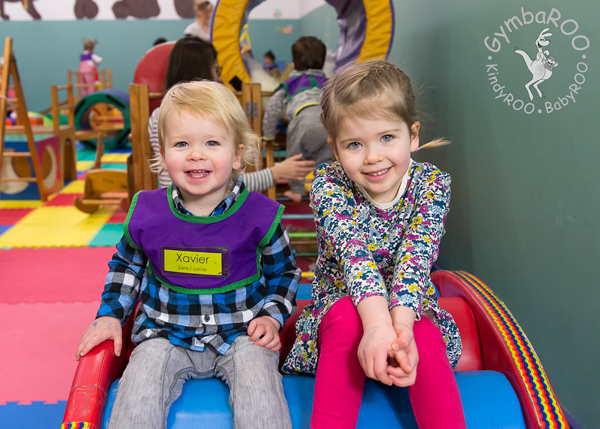
With parent guidance, siblings can grow up to have a close relationship. It’s all about fostering security between your children and strengthening their connections. Sibling relationships can provide a significant source of continuity throughout a child’s lifetime and is often the longest and certainly one of the most important relationships a person will have in life. Friends come and go, but family will be there forever.
Marrianne Schriever is a past school principal and a GymbaROO neuro – developmental consultant.
GymbaROO-KindyROO
Thousands of parents, babies and children are presently involved in our programs and creating rising stars. GymbaROO-KindyROO kids are excelling academically, emotionally, in leadership roles and on the sporting field. Come join all the fun and learning! “GymbaROO – The best decision I ever made for my child.” Classes from 6 weeks old – 7 years GymbaROO KindyROO
Active Babies Smart Kids – Online Baby Classes
GymbaROO-KindyROO’s online series of baby classes is taking the parenting world by storm! It is highly recommended by doctors, paediatricians, early childhood experts and the Maternal Child and Family Health Nurses Association. This series is being called: “The essential guide for parents”. Join the thousands of parents already playing with their babies from birth, in the best way for brain and body development and laying crucial foundations for future learning. What happens in the first year, not only matters, it matters a lot!
Active Babies Smart Kids BabyROO series – Click here.
Try the first class FREE! Click here to watch our Active Babies Smart Kids Episode 1 – Tummy Time
Enjoy the following GymbaROO-KindyROO articles
GymbaROO-KindyROO: Who, what, where, why and how
All about GymbaROO-KindyROO’s online baby classes for parents and babies: Active Babies Smart Kids
How to raise a smarter, happier baby
Why active babies make smart kids
Become a GymbaROO-KindyROO franchisee
Toilet training. When, why and how.
Thinking about buying a pram? What you need to know.
Why GymbaROO kids excel academically.
Why GymbaROO kids excel at the three R’s – wRiting, Reading, aRithmetic (maths).
Why GymbaROO kids excel at sport.
Why GymbaROO kids excel socially and in leadership roles.
Understanding tantrums – it’s all about the brain.
Finger Painting – A Brilliant Activity for Babies and Toddlers.
Baby Development Classes. Why GymbaROO for Babies?
Click here for more GymbaROO-KindyROO article choices

